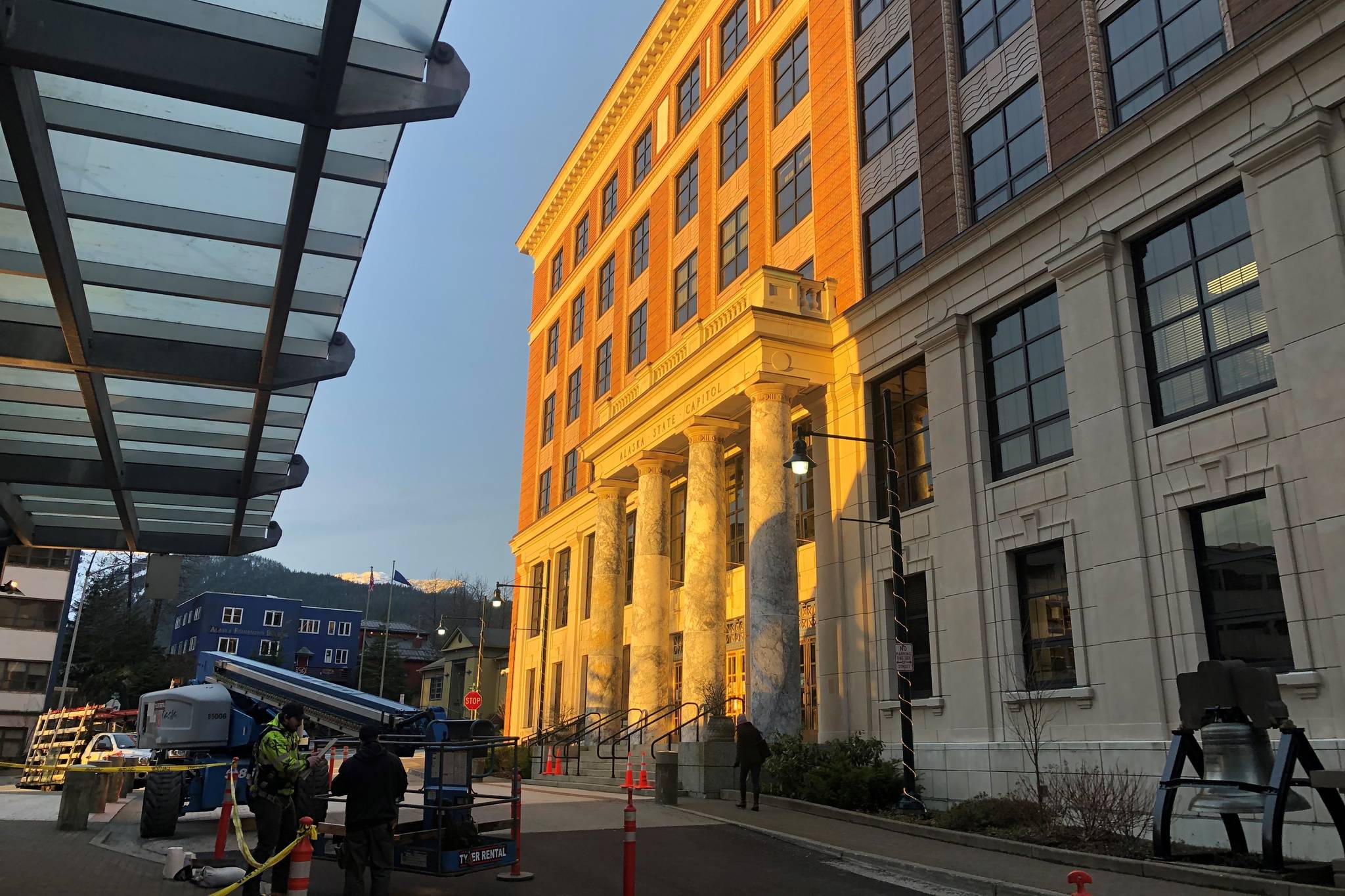Correction: An earlier version of this article incorrectly stated the amount lost by the Permanent Fund in 2020. The amount is $7 billion, not $3 billion. This article has been updated to reflect this change. The Empire regrets the error.
State lawmakers will have to come up with plans for budget cuts and new revenues this year if they want to stave off a $1.2 billion hole in the budget in the 2023 Fiscal Year, Alexei Painter, an analyst for the Legislative Finance Division told the House Finance Committee.
Speaking to lawmakers from the state Capitol in Juneau Friday, Painter said large draws on the Earnings Reserve Account of the Permanent Fund proposed in Gov. Mike Dunleavy’s budget would come at a long-term cost of lost future revenue.
“It does come at a long-term cost, it comes at a cost of future revenue,” Painter said. “Meaning that essentially in the future it will result in a tax increase or reduced services, and that is a policy call for you as a legislature to make.”
Overdraws on the reserve account effectively mean a permanent increase in the state’s deficit, as that money would not be earning interest and the total amount of money that is earning interest would be less, Painter said. A 5% overdraw on the account would increase future deficits per year by $160 million in real terms, Painter said.
[Dunleavy proposes budget for ‘unprecedented’ times]
As part of his budget, Dunleavy is proposing a supplemental Permanent Fund Dividend of $1,916 for Fiscal Year 2021 and a dividend of $3,056 for the next fiscal year. The governor’s plan relies on a $3.1 billion transfer from the Earnings Reserve Account of the Permanent Fund for both 2021 and 2022.
The large PFD payments, along with proposals for infrastructure bonds to fund shovel-ready projects are an effort to kickstart the Alaskan economy after the COVID-19 pandemic.
After the release of the proposed budget, several lawmakers criticized the governor’s plan to overdraw the reserve account. In a statement in December, House Speaker Bryce Edgmon, I-Dillingham, said, “The governor’s proposal calls for spending $3 billion more than what the Alaska Permanent Fund Corporation considers sustainable, and there is no plan for how we will make ends meet beyond next year.”
If the Legislature were to choose taxes as a source of new revenue, Painter said, that would have to be decided this year if the money was going to be available in the 2023 Fiscal Year as new taxes take time to set up. Many state agencies had suffered cuts over the past years, Painter said, but those cuts had not been distributed evenly and affected small state agencies more than larger ones.
But the governor said the state’s economy will need some time to recover before it can handle them.
“Alaska’s economy has been significantly impacted by the pandemic and will need sufficient time to recover before any new taxes are considered,” Dunleavy spokesperson Jeff Turner said Friday in an email.
[Permanent fund CEO stresses long-term focus]
From Fiscal Year 2015-2021, there’s been an overall reduction of 13.8% in state spending, according to Painter, most of which came from agencies that aren’t related to schools, health or public safety. The Department of Health and Social Services’ budget declined by 6% during that time period and the Department of Education and Early Childhood Development was reduced by 2.3%, according to Painter’s data. All other state agencies were reduced by a cumulative 35.6%, or $441 million, Painter said. During that time spending on public protection agencies, what Painter said was a broad description of police and other public safety workers, had increased by 6%.
Former deputy commissioner of the Department of Revenue Larry Persily also testified to lawmakers Friday, and said filling the future $1.2 billion deficit will taxes alone would be “a heavy lift.” Other revenue sources and additional cuts to services would be necessary, he said.
“Having gone through this for years, the biggest spending are K-12, Medicaid and dividends,” Persily said. “You’d be pretty hard-pressed to cover a $450 million reduction in three years that doesn’t affect the big items. Substantially.”
Any new infrastructure for taxes would need to be set up soon, Persily said, but Dunleavy is also proposing a constitutional amendment that would prevent any new taxes without a direct vote of the people. If that were to pass, it would substantially limit the state’s options for revenue, Persily said. In his budget, the governor reference new revenue sources, Persily said, but didn’t go into specifics on what those sources might be.
In advertisements running on his Facebook page, Dunleavy argues the state can afford such a large draw from the Permanent Fund because the fund grew by $11 billion since March of 2020 alone. Persily was critical of that argument saying that is true, but only after a $7 billion loss in the spring. There is still a lot of uncertainty in the economy, Persily said, and cautioned against drawing so much from the Permanent Fund.
The state has already exhausted its other savings accounts, the Constitutional Budget Reserve and the Savings Budget Reserve, Painter said. The state needs to find new revenue or cut programs, he said, and each year the deficit continues, the worse the problem will become.
“Now, we don’t have anywhere to turn to other than again overdrawing the ERA,” Painter said. “Every year we draw more from the ERA than the statute calls for, means that we’ll have higher taxes or reduced services in the future.”
• Contact reporter Peter Segall at psegall@juneauempire.com. Follow him on Twitter at @SegallJnuEmpire.

